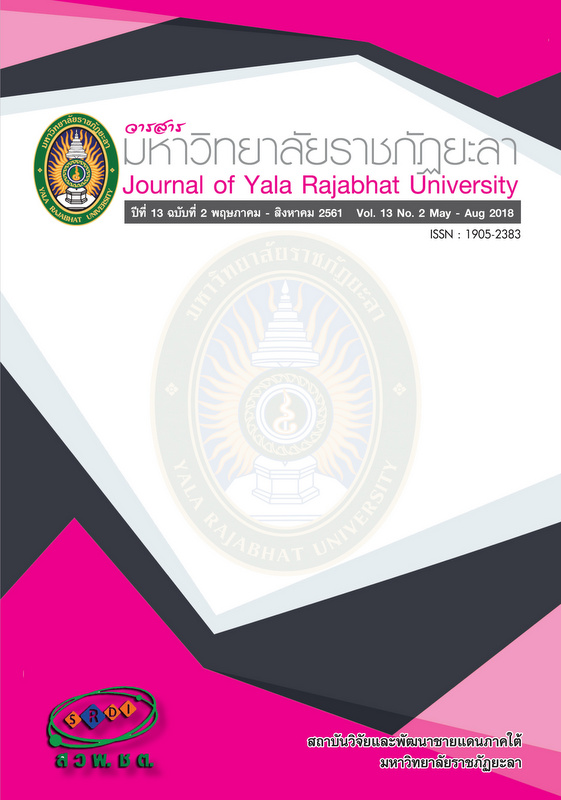การประเมินโครงการจัดตั้งห้องเรียนพิเศษโปรแกรมวิทยาศาสตร์และคณิตศาสตร์ Science and Mathematics Program (SMP) มหาวิทยาลัยราชภัฏยะลา
Main Article Content
บทคัดย่อ
การประเมินครั้งนี้มีวัตถุประสงค์เพื่อประเมินโครงการจัดตั้งห้องเรียนพิเศษโปรแกรมวิทยาศาสตร์และคณิตศาสตร์ Science and Mathematics Program (SMP) มหาวิทยาลัยราชภัฏยะลา โดยใช้กรอบการประเมินแบบ CIPP MODEL ได้แก่ ด้านสภาวะแวดล้อม ด้านปัจจัยเบื้องต้น ด้านกระบวนการ และด้านผลผลิต เครื่องมือที่ใช้เป็นแบบสอบถามและแบบสัมภาษณ์ จำนวน 6 ฉบับ โดยทำการหาคุณภาพของเครื่องมือเป็นค่าความเที่ยงตรงเชิงเนื้อหากับผู้เชี่ยวชาญ และหาค่าความเชื่อมั่นของเครื่องมือด้วยวิธีการหาสัมประสิทธิ์แอลฟ่าครอนบาค ได้ผลตั้งแต่ 0.78 -0.83 กลุ่มเป้าหมายคือ ผู้บริหารโรงเรียนครูวิทยาศาสตร์ และนักเรียนชั้นมัธยมศึกษาปีที่ 4 ที่เข้าร่วมในโครงการทั้งหมด สถิติที่ใช้คือค่าเฉลี่ยและส่วนเบี่ยงเบนมาตรฐาน ผลการประเมินพบว่า ด้านสภาวะแวดล้อม ด้านปัจจัยเบื้องต้น และด้านกระบวนการ มีผลการประเมินภาพรวมมีความเหมาะสมอยู่นระดับมาก ด้านผลผลิตแบ่งออกเป็น 3 ส่วน คือ ส่วนแรกเป็นผลลัพธ์สู่ผู้เรียน มีผลดังนี้คือ สมรรถนะสำคัญของผู้เรียนในศตวรรษที่ 21 ศักยภาพทาง
ด้านวิทยาศาสตร์ พบว่า โดยภาพรวมอยู่ในระดับมาก เจตคติต่อการเรียนวิชาวิทยาศาสตร์พบว่า โดยภาพรวมอยู่ในระดับปานกลาง พฤติกรรมขยันหมั่นเพียรพบว่า โดยภาพรวมอยู่ในระดับจริงเป็นบางครั้ง ความกระตือรือร้น ความรับผิดชอบ และความมีวินัยพบว่า โดยภาพรวมอยู่ในระดับจริงส่วนที่สองผลลัพธ์สู่ครูวิทยาศาสตร์และคณิตศาสตร์ มีผลดังนี้คือ ความรู้และทักษะแห่งอนาคตในศตวรรษที่ 21 และสมรรถนะครูวิทยาศาสตร์พบว่า โดยภาพรวมอยู่ในระดับมาก และส่วนที่สามความพึงพอใจต่อโครงการพบว่า ผู้เรียน ครูและผู้บริหารมีความพึงพอใจโดยภาพรวมอยู่ในระดับมาก
Article Details
บทความ ข้อมูล เนื้อหา รูปภาพ ฯลฯ ที่ได้รับการเผยแพร่ในวารสารมหาวิทยาลัยราชภัฏยะลานี้ ถือเป็นลิขสิทธิ์ของวารสารมหาวิทยาลัยราชภัฏยะลา หากบุคคลหรือหน่วยงานใดต้องการนำทั้งหมดหรือส่วนหนึ่งส่วนใดไปเผยแพร่ต่อหรือกระทำการใดๆ จะต้องได้รับอนุญาตเป็นลายลักษณ์อักษรจากวารสารมหาวิทยาลัยราชภัฏยะลาก่อนเท่านั้น
เอกสารอ้างอิง
2.Boonlue, R. (2005). Development of Ethical Behavior in Responsibilities Using Activities with Authentic Assessment VS Activities with Normal Assessment. Bangkok: Office of Knowledge Management and Development (Public Organization). (in Thai)
3.Ministry of Education. (2015a). Results of educational Operations in 3 months of Ministry of Education [Online]. Retrieved March 28, 2015, from: http://www.moe.go.th/moe/th/news/detail.php?NewsID=39899&Key=news_act. (in Thai)
4.Ministry of Education. (2015b). Performance Ministry of Education [Online]. Retrieved January 2, 2015, from: http://www.moe.go.th/moe/th/news/detail.php?NewsID= 39899&Key=news_act. (in Thai)
5.Panich, W. (2012). The way of create learning for student in 21st Century. Bangkok: Sodsri-
Saridwongso Foundation. (in Thai)
6.Penpukdee, S. (2006). A handbook of developing diligence for the first level-primary education students. Master’s Thesis. Srinakharinwirot University. (in Thai)
7.Rachatawipasanun, P. (2005). Development of Teacher Competency in Physical Science Networks of Secondary School under the Department of General Education in Northern Region. Bangkok: Prikwarn Graphic CO.,LTD. (in Thai)
8.Science Manager. (2014). National Science Technology and Innovation Policy Office Indicates the lack of scientific labor [Online]. Retrieved March 28, 2014, from: http://www.unigang.com/Article/17748. (in Thai)
9.Stufflebeam, D. L. & Skinkfield, A. J. (2007). Evaluation Theory, Models, and Applications. San Francisco: Jossey - Bass.
10.Thailand Development Research Institute. (2012). Education Policy of the Ministry of Education. Bangkok: Thailand Development Research Institute. (in Thai)
11.Thanakumdee, T. (2009). The Devekopment of Self - Discipline Test for Level Two Students under Bangkok Education Service Area Office 1. Master’s Thesis. Srinakharinwirot University. (in Thai)


